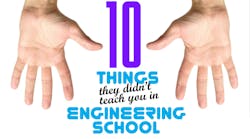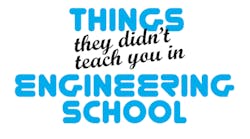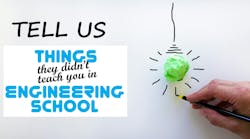10 (More) Things They Didn't Teach You in Engineering School
We got some feedback from experienced engineers to get the low down on what you may not have learned in college, or at least what they did.
Table of Contents
- There is More to Engineering than the R&D Lab
- Real Work is About Gaining Value for Your Company
- Drive Your Professors to Excellence
- Test and Measurement Should Be a Core Subject for All EEs Today
- Learning to Think Like a Systems Engineer
- Become Your Own Biggest Promoter
- The Struggles of Paperwork
- Practical Hands-On Teaching in Schools
- It’s All About the Money
- No “Real-World” Experience, But Here’s How to Get Some
If your college is anything like mine, you weren’t really taught that there was much out there after graduation aside from design work. Don’t get me wrong, design roles are obviously critical in innovation and we will always need R&D engineers, but it’s not for everyone. There are many engineering students out there (like me) who want to work on technical projects, but also would like a career that allows them to be more artistic and perhaps travel the globe to meet customers.
I remember working on one of my design labs my fourth-year thinking, “Man – I really don’t want to do this every day for the rest of my life.” Well, that was a horrifying realization in my last year of engineering school… But then, I saw the light at the end of the tunnel. I learned about technical marketing. Something I had never really thought about before, but it made so much sense after I learned about it. An engineering company needs engineers to design the products, but they also need engineers that can market and sell those high-tech products. They need technical people who can understand when and how customers can use the products for each of their specific applications. However, they also need people who are creative and sociable that can create content and meet customers.
It automatically clicked – technical marketing is where I belong! I can exercise my technical and creative skills every day in creating content like how-to videos or application notes to help customers use our products better and easier. But, I also get to be very social in the sense that I am able to travel the world to meet with VIP customers and work at tradeshows. If you are anything like me and need a little bit of both—tech and creativity—be sure to check out positions like technical marketing! You most likely won’t hear about this from your professors, but you’ll find positions like this at most technical/electrical engineering companies.
We work our way through universities to gain the skills necessary to become highly technical, problem-solving, creative engineers. We learn the skills necessary to change the world through ground breaking technology. But after we’ve learned all this in school, is that enough to succeed?
What they don’t teach you in school is that companies mostly exist to add value to their stock holders. That means that management is interested in value provided to the company as measured by a few key metrics. Things like speed, cost, quality, and efficiency. All of these can be measured for bottom-line results to the company. In general, academic science projects “need not apply” unless they are directly solving problems that involve these key metrics in a significant way. People investment is significant for companies and having all those people adding direct value to the company can catapult business results. We exist in our industry and our companies to add meaningful value.
I always cringe when I’m asked what my engineering school didn’t provide. I’m not a complainer and I tend to take responsibility for things I seemed to have missed. There were a lot of great things I got out of the experience, mostly because I was serious about applying myself to the adventure. But here are some things that would have been helpful, as I left the ivory tower and dove into my career.
The key downfall of my education was the absence of public-speaking opportunities. I don’t mean this in a formal sense. I mean that we weren’t encouraged to explain how things worked. This shortcoming really impacted my professional work, as I’m always asked by fellow engineers and customers how things work. A loss for words is deadly.
I spent a lot of personal time looking at industry magazines and tried to get a sense for what was happening out there in industry. This was definitely not part of the curriculum and none of my instructors seemed to be interested, or they never talked about it. I graduated with no particular industry ambition, just that I knew I wanted an engineering job.
I had no idea that there were positions available besides the design engineer, and no idea there was more to the industry than the IC manufacturing process. In the university, a design engineer was the preferred position and the university I went to had a strong focus on IC fabrication. Well, I was hired as a designer and quickly found out that it was not my cup of tea. Frankly, most professional engineers are doing everything but design. Actually, a majority of professional engineers are not even “wired” to be a designer, and that is ok.
My best classes were the ones where I saw the theory applied. These cases were few and far between. Most professors came in to follow the course’s book. But the question in my mind was “How would you apply that theory?” The answer seemed to be “Don’t know. There’s a lot to cover. We need to go to the next chapter.” So, the moral of this story is to drive your professors to excellence. That way both of you will be happier.
One of the subjects that should be included as a core topic in a BSEE degree program is test and measurement (T&M). Familiarization and use of different test instruments and measurement procedures is critical to most engineering jobs.
Test instruments are the eyes of the engineer looking into the circuit or system they are designing. Basic hands-on lab work is often minimal in many college programs. It is usually limited to using a DMM and oscilloscope if any lab work is provided at all. Students should also be aware of other test instruments, their use, and common measurement procedures. Examples include the spectrum analyzer, vector signal generator, network analyzer, impedance meter, frequency counter, logic analyzer, etc.
Circuit and instrument simulation software has taken the place of real-world circuits and instruments in many schools. Yet students will benefit by knowing how to use real test instruments on actual circuits. I have witnessed graduate EEs embarrassed and unable to use an oscilloscope to make basic voltage and frequency measurements on an IC during an interview test. While a separate T&M course would be a great solution, just including some T&M in other course lab work would suffice in most cases.
Engineers can very easily fall into the trap of thinking of themselves in a certain way, such as a “hardware” or “software” engineer, or even more narrowly, as a “digital” or “power” engineer. When this mindset leads to a myopic focus on a narrow area while ignoring the bigger picture, this can be a career-limiter. Years ago, I met an engineer who was designing military radar systems for F-16 fighter aircraft and shipboard naval applications. He taught me the value of developing a systems-engineering mindset and showed me how taking a systems-level approach not only makes it easier to understand how each hardware and software component worked independently, but also how they worked within the system as a whole.
In designing a particular electronic component, such as an amplifier, it is easy to get focused exclusively on its design requirements, such as gain, noise, figure, and output power for a specific band of frequencies. But when you understand how that amplifier fits into the overall system, you gain insight into system issues such as power consumption and size, which may be just as important, if not more so.
Adopting a systems-level viewpoint also makes it easier to appreciate the efforts of other engineers on the team, and my takeaway was that everyone plays a role in that team’s success. That lesson stayed with me through every engineering project and through life, and it has helped me to appreciate the value of teamwork.
There is a big difference between confidence and arrogance, and to sell yourself you need to have the confidence in your skills without coming across like a jerk. Before they even graduate or start interviewing, students need to learn how to promote themselves.
Every student will have a degree and generally the same classes and skills, so the key is to make sure you stand out from the pack.
For example, one of my professors always told me that I should get my lab reports published (as he thought they were quite good), but I never knew how to actually do that.
Today, the internet has many resources. Being published on a professional website or even starting a blog will show that a student has gone the extra step. Getting something published also demonstrates how well the student knows how to communicate and present his or her work, which is a skill that is often not stressed in an engineering curriculum.
Other ways you can set yourself apart at the interview are having things like involvement in extracurricular classes or programs, independent or hobby projects, even volunteer work under your belt. In addition, you should already have answers ready for common questions.
Even if you don’t get asked the exact questions you prepare for, the prep will give you confidence and an understanding on how to handle much of the conversation during an interview. Something like the STAR technique will help you to prepare and answer questions fully in a non-rambling way and ultimately help you to land your dream job.
When I entered the workforce, the number one thing that shocked me was paperwork. Paperwork in the engineering world runs everything. Signing off on drawings, documenting the entire review process, and approval of test plans are all commonplace in the work environment, but not so much in the school environment.
In school, they teach you how to prepare a report and to organize your results. You learn how to show work cleanly and concisely, and the only person that needs to sign off on it is your professor. Not so much in the work environment. I’ve had too many experiences of doing all the engineering work, weeks of data gathering and calculations, all to be torn to shreds by different reviewers.
What I learned is that engineers, just like everyone else, are particular. They may want your calculations to be a certain way or for your phrasing on a report to be listed in such a particular manner. The same goes with modeling. No two engineers will model the same. They will choose different design paths and the design engineer is always at the mercy of the supervisor.
My advice for younger engineers is to learn how to be flexible. Engineers are very logical people and when we come to a decision, we stand by it 100%. However, other engineers will disagree and when they do, you have to learn how to introduce your argument in different ways so that everyone can understand it, regardless of perspective.
Using test-and-measurement equipment is clearly one of the most important aspects of working in the RF/microwave industry. Any company that manufactures high-frequency products relies on test instruments not only for production testing, but also for developing engineering prototypes. But are universities teaching students the hands-on skills needed to work as an RF engineer? Based on my own experience in school, the answer to that question would be no. While textbook knowledge is obviously important, so is the ability to use instruments like vector network analyzers, spectrum analyzers, and signal generators. For me, my experience using this type of equipment did not begin until after I graduated college and began to work in the industry. I would venture to say that this scenario is the same for many others as well.
The challenge in this area surrounds the fact that test equipment is often rather expensive. However, some test-andmeasurement companies are now selling portable equipment that is typically more economical than traditional benchtop instruments. That means these instruments can easily be passed around in a lab environment. Hence, these cheaper portable instruments could have much to offer in the academic realm.
I can say that working with test-and-measurement equipment would have benefited me greatly when I was in school. Therefore, I think that this is an area in which universities may want to invest. Students would receive a more practical hands-on education that will benefit them when enter they the industry. I also think it would benefit companies because they would need to spend less time teaching young engineers the basics of using test-andmeasurement equipment when they begin their careers.
It is not unusual to go through a four- or five-year engineering curriculum and never hear the words “cost of budget” mentioned in the classroom.
Many engineering students conflate the words “science” and “engineering,” and the faculty either doesn’t notice or ignores that fact. The students are left believing engineers go around like some Elon Musk character inventing new devices such as artificial hearts and flying cars, helping land humans and machinery on other planets, or are busy breaking speed records in aircraft, cars, and boats. The engineering schools don’t help. By and large, they point to one-off projects such as the Apollo Moon Missions, the Manhattan Project, or Barney Clark’s artificial heart as great engineering feats.
The fact is, engineering is all about the money. As Nevil Shute said (paraphrasing): “An engineer can do for ten 75 cents what any fool can do for a $10.” In other words, engineers are tasked with coming up with the least expensive way of accomplishing some task, whether that is making and bottling soda pop, heating food without generating CO2, or disposing of nuclear waste.
Sure, there are newly minted engineers whose first job is on space shuttle replacement or a new nuclear submarine. But odds are, they are assistants to engineering teams tackling small parts of those projects. Most new engineering grads are more likely to find themselves trying to shave 50 cents off a $5 component or cut the weight of a hinge by 12%. And in most cases, the new engineers have little knowledge or hands-on experience in lowering costs while maintaining or improving performance. They have no experience in setting a budget, working under it, or what to do if it’s not enough. They have no gut feel or intuitive feel for what things cost. Is it cheaper to stamp a part if you are going to make 10,000 of them? Or should you opt for injection molding instead? If titanium is so strong, light, and corrosion-resistant, why not specify it for everything?
I know college deans would say there is no more room in the four-year engineering curriculum, but if they were to kick all the phys ed requirements to the curb, and lighten up on the social studies, I think they could shoehorn in two semesters of Engineering Economics into the senior year.
Upon reflection of my personal college experience, I feel that my courses focused almost exclusively on the theoretical aspects of engineering and were lacking in terms of real-world experience and opportunities.
Students rely heavily on computers and memorized equations and do not yet have a grasp on practical skills. In the field, conceptualization, attention to detail, material selection, tolerance precision, and manufacturability are large factors in a successful product.
I feel that all of these are most effectively learned through practice and are thereby difficult to teach in a lecture hall. I highly suggest that students join clubs (e.g., robotics, SAE, SWE) and apply for internships to gain essential experience that can be applied to their future careers in engineering.













